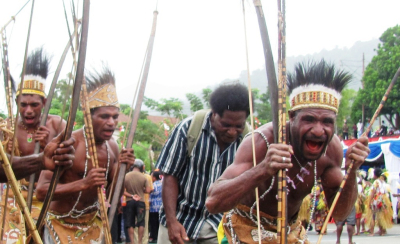The first Denisovan human fossils have been found in Siberia, which is nearly 8,000 km from New Guinea. But Denisovan’s DNA was passed on to the Papuans and it helped the Papuans’ immune system.
The first time I went to Papua was in 2005 to attend the Kamoro Festival in a village in Mimika. I met Kal Muller, a Freeport cultural consultant who assists the Kamoro people in developing the art of carving. Living in the village, Kal Muller lives with the community. It was from him that I learned the story of the tambelo, the mangrove worm. According to him, tambelo has a high protein content.
With the Latin name Bactronophorus Sp, tambelo contains a protein content of up to 8.21% before fermentation and becomes 9.5% after fermentation. This is the result of research by the Bogor Partanian Institute (IPB) in 2015 entitled “Tambelo Chemical Composition (Bactronophorus sp.) and characteristics of fermented products”.
In addition to tambelo, there are also caterpillars of sago (Rhynchophorus ferrugenesis) which also has a very high protein content. The protein content reaches 32.54%. This is according to a research by the University of Muhammadiyah Semarang (Unimus) in 2018. Oohya! Please also read: Sago Worm Festival in Papua, How do Papuans raise Sago caterpillars?
Scroll to read
Scroll to read
During that visit to Mimika, I also met a doctor at Freeport Hospital. He told the story of a Papuan patient who had to walk one day and one night from his village to reach the hospital. As soon as he arrived at the hospital door, the person immediately passed out. After checking his platelets, there were only 8,000 left. Of course the doctors were surprised, with only 8,000 platelets still being able to walk a day and night from their village for treatment.
Then I guessed, maybe the influence of tambelo protein they usually consume. Proteins in the body certainly play an important role in regulating the metabolic processes to help the body’s defense mechanism against various bad bacteria from outside the body.
But apparently, Papuan immunity is also aided by their DNA. Recent research claims that the native Papuans have the first human Denisovan DNA, fossils of which have been found in Denisova Cave, Siberia. Denisovans are said to be related to Neanderthals. Research publication titled “Denisovan Introgression Shaped the Immune System of Today’s Papuans” on December 8, 2022 in journals.plos.org says early Denisovan humans accounted for five percent of the genomes of Southeast Asians and Australians.
This study involved 56 Papuans to study their genomes. Denisovan DNA in Papuans affects how strong and coherent the immune cells are and the immune function of Papuans. Denisovan DNA is also said to help Papuans adapt to the Papuan nature.
Priyantono Oemar
“).attr( type: ‘text/javascript’, src: ‘https://platform.twitter.com/widgets.js’ ).prependTo(“head”); if ($(“.instagram-media “).length > 0) $(”


